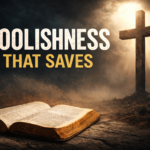
Texts: John 1.43-51; 1Corinthians 6.12-20; Psalm 139; 1Samuel 3.1-10
Theme: Inclusively human
___________________________
Intr – “It is a big problem for human life when it becomes exclusively human.” This is inspired in a comment of Charles Taylor in “A secular age”.[1] I don’t know if that is exclusive to our time, but it is certainly true about our time. We may get so involved with the immanent, the things of this world, and with all the explanations we think we have about everything, that we may stop considering the transcendent – God, His existence, His presence, and His action.
Some examples from our current generation:
–Nothing has generated something is the most commonly accepted version for the origins of everything. Even though Newton’s 2nd law of physics makes it clear that “an object will not change its motion unless a force acts on it”, the explanation is inside the human, material realm.
–Love is love. It doesn’t matter if you have a God who says otherwise. Love is love and we humans get to define what that means, and how we will use our bodies to express it.
-When you think your time on earth is done, MAID[2] is here to assist you in ending it.
-Your marriage is not good? End it and start over. Not good again? End is again and start over again. You deserve to be happy, and religious laws should not get in the way of your happiness.
These are just four of many examples that could be given to point to the fact that life can become exclusively human. And this is a big problem surrounding us Christians that may affect the way we look to life to.
1 – EXCLUSIVELY HUMAN
Our readings for today also give us subsidies to reflect further on this topic:
1 Samuel – Samuel hears a voice, and he thinks it is coming from a person, not from something outside of the human realm. He remains with what is plausible and excludes what is divine in the context, until Eli gives him the wise counsel: “when you hear the voice, just say: “Speak o Lord, your servant is listening”.
“He was just a child’ one could argue. But sometimes we act that way. We hear God talking to us in His Word, or through His ministers, or through His people, and we explain it away. We are tempted to think that we can try our own ways and alternatives in what we see. The most common advice we get around us at to what voice to listen to, it is exclusively human: “Listen to your heart, follow your heart.” The idea is that if you feel in your heart, it must be true. Or “nothing is wrong if it makes you happy.” Exclusively human.
Psalm 139 – This Psalm is it a powerful description of God’s real presence in every aspect of our life. However, when life is exclusively human this may be seen as just good poetry, but not a description of things as they are. It is a good psychological help, but with no practical use to secure and give you orientation for daily life. Exclusively human. We look elsewhere for control, security and orientation. To illustrate one of the current trends in that respect I will change a few words in the text, and we will have a more exclusively human experience of omnipresence:
“O my smartphone, I have searched you me and now you know me!
You know when I sit down and when I rise up; you read my words –maybe even thoughts? – from afar. You search out my path and my lying down and are acquainted with all my ways. [especially in your maps history].
Even before a word is on my tongue, behold, o gadget, you seem to know it altogether.
Such knowledge is too wonderful for me; it is high; I cannot attain it.
Where shall I flee from your presence? If I ascend to the mountains, you are there. If I make my bed in the depths, your signal is there too! If I take the wings of an airplane and dwell in the uttermost parts of the sea, even there my hand shall touch you, and my right hand shall hold you.”
This could be a warning about maladaptive use of cellphones, as it is a real danger, we need to be aware of. But my reflection here is more so about how they can become almost an idol in our hands, as we seek control and security for life. Our phones bring the world to the palm of our hand, making us feel secure and powerful that we have all, or almost all the answers at the tip of our fingers. When doubts come, we have Google, social media or the latest life-guru with a well-crafted phrase or website with answers to satisfy the mind and appease the heart. We think we can obtain control, and then we feel secure. Exclusively human.
2 Corinthians 6 – Paul addresses the topic of the use of the body, and specifically in this reading, the use of the gift of sexuality. However, as life becomes exclusively human, the permissive culture around changes the game, making sexuality not a special, beautiful gift from God to be used wisely within marriage anymore, but something you can use the way you feel better. YOLO[3], and you need to make the best of it. After all, if your body is not the temple of the Holy Spirit – Inclusively Divine – but just a clump of cells, energy, or a mere carcass that will be eaten by worms in the grave – exclusively human – then you are free to use it as you please. Don’t be so shocked about what is called sexual immorality, porneia in Greek(one of the roots of the word pornography), for “times have changed!” The gift becomes a human toy to be used as desired, or to be admired as human art and expression. Exclusively human.[4]
John 1 – Here is a great illustration of what we can call “Finding that you have been found”.[5] Philip says he found Jesus only to discovered he had been found by Him. I want to highlight a detail in the reading that connects to our theme today. When Nathanael sees Jesus, he worships Him as the King of Israel. Jesus however responds to him referring to Himself as “The Son of Man”. Jesus does not repeat his expression “King of Israel”. One of the reasons might be that, even though in faith, Nathanael still held on to the wrong human expectation that the Messiah would be the king who would establish Israel’s earthly kingdom and sovereignty.
When Jesus is seen through exclusively human lens, we may get lost in the “what is the Jesus for” trap. Jesus needs to be somehow useful. Useful or healing, for giving prosperity, for being a social justice warrior or something else. The Word and the Sacraments, the Study of the Bible, and the Christian life and witness are lessened because, after all, if your life is exclusively human, they don’t make much sense. You can’t see anything beyond a book, bread and wine, water, and getting together for human fellowship in an Oasis of human relationships.
The big problem for human life is when it becomes exclusively human. A danger that is around in the world always trying to find a place in our hearts too.
2 – INCLUSIVELY HUMAN
In the Gospel we find the antidote for this: Jesus has opened the heavens for us. Permanently. He makes His Word and is Work inclusively human, for God himself becomes a Man to be among mankind and to make His our human life – though without sin. Humans trend towards being exclusively human; God is always trending towards being inclusively human.
In faith, life changes. It is not exclusively human anymore, for we see the Son of Man, Jesus revealed. He is the King of Israel, no doubt, but as the Son of man. The Redeemer. Jesus opens the heavens so that we can see him for who He is. We are rescued from ourselves and from a life that is exclusively human and brought into the divine reality that includes us in the Kingdom of God. How does that happen? Philip has the answer: “Come and see”. Come and see. We saw and see Jesus in His means, Word and Sacraments. We live them and we share them.
The world around you may have doubts about your faith, or may ask you why you still go to Church, why that Book, why water, why bread and wine… You can talk to them, explain patiently and ll. But you can simply say: “come and see”.[6] Not only to the Church, which is important, but come and see the Gospel. Come and see the story of everything that God has revealed. If a person reads it and comes on the other side still doubting, well that’s on them. Not even God forces anyone into believing, we won’t do that too. But will Philipp we will say, “Come and see”. “Come and taste”. “Come and live”.
These are the “Greater things that we see” in Jesus. We see that life is not exclusively human. What an unfortunate, miserable life that can be. Because it not only shrinks our vision for this world but eliminates Hope for eternity, as we will be eternally away from Christ, in the company of the devil and his angels.
With Samuel we learn, “Don’t listen to your heart, Listen to Him”. With Psalm 139 we learn that God, the Creator of the Universe, is present and active in every aspect of our life with him. With Paul we learn that Our body is the temple of the Holy Spirit and should be treated well. In John we learn that Jesus is more than human, he is divine. It all points in one direction: Life is not exclusively human. Life is Inclusively human. God has included us in His plan of salvation. God has included humanity into divinity, as Jesus took his human body to heavens. God has included all in His plan of salvation, so we are his witnesses to others. “Come and see”.
How does that play out in daily life? Here are five ways in which having our faith into practice we can be inclusively human sharing Christ with your neighbour:
- Word – The Bible is beyond human experience. It is divine. But it is human as well. Therefore, it is not exclusively one or the other, but both together. In no other place people will find this experience. Point them to the Word, and to the Word incarnate – Jesus .
- Forgiveness The Church is becoming the only group in which you can find it. It was already when it comes to Christ’s forgiveness but looks like it is expanding into any type of mercy there could possibly exist even in the secular world. The other day a famous Hollywood actor declared “Cancel culture is killing forgiveness”. Cancel culture points to a movement and spirit of our time that mercilessly erases everything that doesn’t agree with it. Including forgiveness. As Christians, we see greater things. We see forgiveness for all, even for the worst sinner; even for people we don’t like. Forgiveness is available for everyone through repentance and faith in Christ.
- Acting on Love – As you know that life is not exclusively human, you know that every single day is a gift from the Creator, and every action in your day is soaked in God’s protection, contentment, and love. This is a powerful “come and see” to people around you.
- The body of Christ – The Church is the visible sign that life is not exclusively human. For we are not here from our own will, but because God has called us to be together as His people, as the body of Christ. The Church, you, the people, is a beacon to point people toward a life in Christ that is beyond human experience. Here, bear in mind also a good use of your body. No preaching or witnessing will atone for a bad use of your body in daily life. Use your body to glorify God and to be and outdoor sing of God’s inward Grace in your life.
- Understanding – “Be kind, fore every person you meet if fighting a hard battle.” Hard battles cannot be defined in our own terms, but in the other person’s. If we don’t jump the gun, but have patience and ears to listen and understand, we will be opening heavens to people. They will be able to see that there is more than an exclusively human aspect of life. And you and I will be an embodiment of that.
Cc – For a big problem, being exclusively human, a bigger solution – God’s inclusion of Humanity in his Love. Actually, this is the only one solution. When life is becoming exclusively human, we need Heavens open to us. The Son of Man has done that. Heavens are open to you. Life is now open to you, beyond our exclusively human eyes. You have the God that knows you, searches you, follows you and will sustain you in the palm of your hands. He offers that for eight billion people in the world. And at the same time, but faith in Christ, exclusively to you.
__________________________________
[1] As heard in the Concordia Theology Podcast “Lectionary kick-start”, Second Sunday in Epiphany. Available at https://concordiatheology.org/2024/01/second-sunday-after-the-epiphany/ Accessed: Jan 12, 2024.
[2] Medical Assistance in Dying
[3] You Only Live Once
[4] As an extra note about how important our “body” is, connecting with Psalm 139, where the psalmist affirms God “formed ME”. He declares of himself to be an autonomous, human being right of the bat inside his mother’s womb. Life starts when God creates it, not when human standards define it(autonomy, viability, sentiency, etc…).
[5] Dr. David Schmitt on the Concordia Theology Podcast “Lectionary kick-start”, Second Sunday in Epiphany. Available at https://concordiatheology.org/2024/01/second-sunday-after-the-epiphany/ Accessed: Jan 12, 2024.
[6] Vo, Kari. “Come and See”. https://www.facebook.com/watch/?ref=search&v=339704062197413&external_log_id=0f228717-beba-4e27-b8d2-45c81602675d&q=dr.%20kari%20vo%20lutheran%20hour






